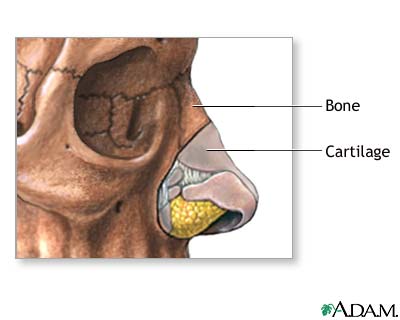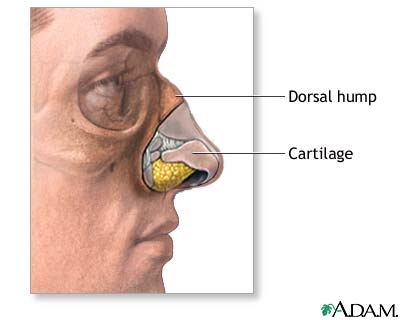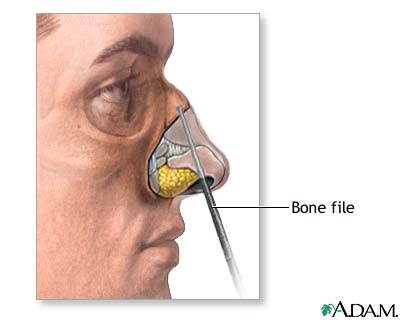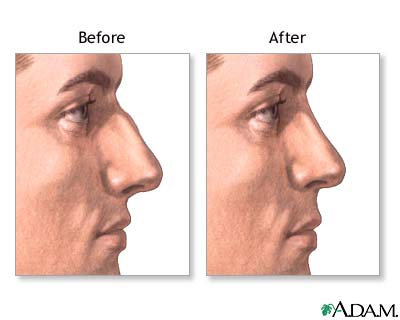Health Library
Nose surgery - series

Normal anatomy
The nose is made up of bone and cartilage. The size and relationship of the bone and cartilage which make up the nose determine the size and shape of the nose.

Indications
Nose surgery (rhinoplasty) offers improvement in the appearance in cases in which the nose is cosmetically unappealing. Age may also be a consideration.
Many surgeons prefer not to perform cosmetic (elective) rhinoplasties until the growth of the nasal bone is completed (around 14 or 15 for girls, a bit later for boys).

Procedure
With local anesthesia, the nose and the surrounding area is numbed. The patient will usually be lightly sedated but awake during the surgery, and relaxed and insensitive to pain. The surgery is usually done through the incision inside the nostrils. Instruments inserted through the nostril, are used to reshape the bones which make up the nose.

Aftercare
The results of surgery are variable, depending on the initial shape of the nose, but rhinoplasty offers significant improvement in appearance in many cases.
BACK TO TOP
Review Date: 3/2/2023
Reviewed By: Tang Ho, MD, Associate Professor, Division of Facial Plastic and Reconstructive Surgery, Department of Otolaryngology – Head and Neck Surgery, The University of Texas Medical School at Houston, Houston, TX. Also reviewed by David C. Dugdale, MD, Medical Director, Brenda Conaway, Editorial Director, and the A.D.A.M. Editorial team.
 | A.D.A.M., Inc. is accredited by URAC, for Health Content Provider (www.urac.org). URAC's accreditation program is an independent audit to verify that A.D.A.M. follows rigorous standards of quality and accountability. A.D.A.M. is among the first to achieve this important distinction for online health information and services. Learn more about A.D.A.M.'s editorial policy, editorial process and privacy policy. A.D.A.M. is also a founding member of Hi-Ethics. This site complies with the HONcode standard for trustworthy health information: verify here. |
The information provided herein should not be used during any medical emergency or for the diagnosis or treatment of any medical condition. A licensed medical professional should be consulted for diagnosis and treatment of any and all medical conditions. Links to other sites are provided for information only -- they do not constitute endorsements of those other sites. No warranty of any kind, either expressed or implied, is made as to the accuracy, reliability, timeliness, or correctness of any translations made by a third-party service of the information provided herein into any other language. © 1997- 2024 A.D.A.M., a business unit of Ebix, Inc. Any duplication or distribution of the information contained herein is strictly prohibited.
